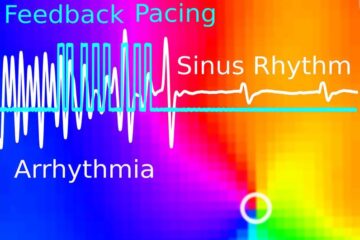New method: research team analyzes stress biology in babies

After waking up, the concentration of the stress hormone cortisol in saliva rises considerably; this is true not only for grown-ups but for babies as well. A research team from the Ruhr-Universität Bochum and from Basel has reported this finding in the journal Psychoneuroendocrinology.
“This gives us a new, non-invasive and uncomplicated possibility to already research the activity of the stress system during infancy,” Prof. Dr. Gunther Meinlschmidt, of the Clinic of Psychosomatic Medicine and Psychotherapy at the LWL University Hospital of the RUB, said. The information not only open doors to the pursuit of as-yet unresolved research inquiries, but could also be used in the future to diagnose illnesses in the hormone-producing organs, such as the adrenal gland, of infants.
Testing stress hormones: easy with grown-ups, hard with babies
Scientists usually test the stress hormones of grown-ups by placing test subjects in an experiment under stress-inducing conditions. Since a similar practice is, for ethical reasons, unthinkable to use with babies, it is rather more difficult to find out how well-developed their stress systems are. The German-Swiss research team circumvented this problem by observing a naturally occurring “stress situation” – waking up. The cortisol-concentration in grown-ups rises after they wake up, presumably to prepare the body for the requirements of the day. At what age this cortisol-reaction develops has long been unclear.
Cortisol levels rise in babies upon waking up
Data from 64 newborns and infants between the ages of three weeks and six months were used in the study. On two days the infants’ parents had their children suck on a small cotton swab at home, once right after waking up and once half an hour later. Through this saliva, the scientists determined the cortisol-concentration. The cortisol amount rose considerably after the infants awoke in 63 % of cases. Neither the hour that the child woke up nor breastfeeding after waking played any role in these findings.
The shorter the pregnancy, the less the cortisol-level rises
Instead the length of the pregnancy had an effect. The earlier the children were born, the less their cortisol-levels rose after they woke up. “The stress hormone system may be less mature in babies who were born after a shorter pregnancy, which could have negative consequences,” assistant professor Marion Tegethoff, of the Faculty for Psychology at the University of Basel, said. Since cortisol can inhibit the immune system, the lack of cortisol-level rises could lead to excess immunological responses, similarly to what occurs with allergies.
Approaching new research questions through saliva tests
Stress increases the risk for mental disorders and bodily illnesses. There is now a new method available to investigate the stress systems easily in babies. Prof. Meinlschmidt, head of the Research Department of Psychobiology, Psychosomatics, and Psychotherapy at the LWL University Hospital in Bochum explains future research questions: “In some rodents the hormonal stress response in the first weeks of life is, for a specific timeframe, close to shut down – perhaps to protect organs that are developing during this time. It is still unknown if there is a comparable phase in humans, since it has long been impossible, because of ethical reasons, to repeatedly assess the hormonal stress reaction.”
Bibliographic record
M. Tegethoff, N. Knierzinger, A.H. Meyer, G. Meinlschmidt (2012): Cortisol awakening response in infants during the first six postnatal months and its relation to birth outcome, Psychoneuroendocrinology, doi: 10.1016/j.psyneuen.2012.08.002
Further information
Prof. Dr. Gunther Meinlschmidt; Research Department of Psychobiology, Psychosomatics, and Psychotherapy; Clinic of Psychosomatic Medicine and Psychotherapy, LWL University Hospital, Alexandrinenstrasse 1-3, 44791 Bochum, Germany, Phone: +49/234/5077-3173
gunther.meinlschmidt@rub.de
Research Department of Neuroscience at RUB
http://www.rd.ruhr-uni-bochum.de/neuro/index.html.en
Editor: Dr. Julia Weiler
Media Contact
More Information:
http://www.rd.ruhr-uni-bochum.de/neuro/index.html.enAll latest news from the category: Life Sciences and Chemistry
Articles and reports from the Life Sciences and chemistry area deal with applied and basic research into modern biology, chemistry and human medicine.
Valuable information can be found on a range of life sciences fields including bacteriology, biochemistry, bionics, bioinformatics, biophysics, biotechnology, genetics, geobotany, human biology, marine biology, microbiology, molecular biology, cellular biology, zoology, bioinorganic chemistry, microchemistry and environmental chemistry.
Newest articles

Wildfire danger to increase due to climate change
WSL Institute for Snow and Avalanche Research (SLF) researchers expect an elevated wildfire danger in the Alpine Foreland from 2040 onwards due to changing meteorological conditions. The danger currently remains…

Advanced Brain Science Without Coding Expertise
Researchers at Helmholtz Munich and the LMU University Hospital Munich introduce DELiVR, offering a new AI-based approach to the complex task of brain cell mapping. The deep learning tool democratizes…

Gentle defibrillation for the heart
Using light pulses as a model for electrical defibrillation, Göttingen scientists developed a method to assess and modulate the heart function. The research team from the Max Planck Institute for…





















